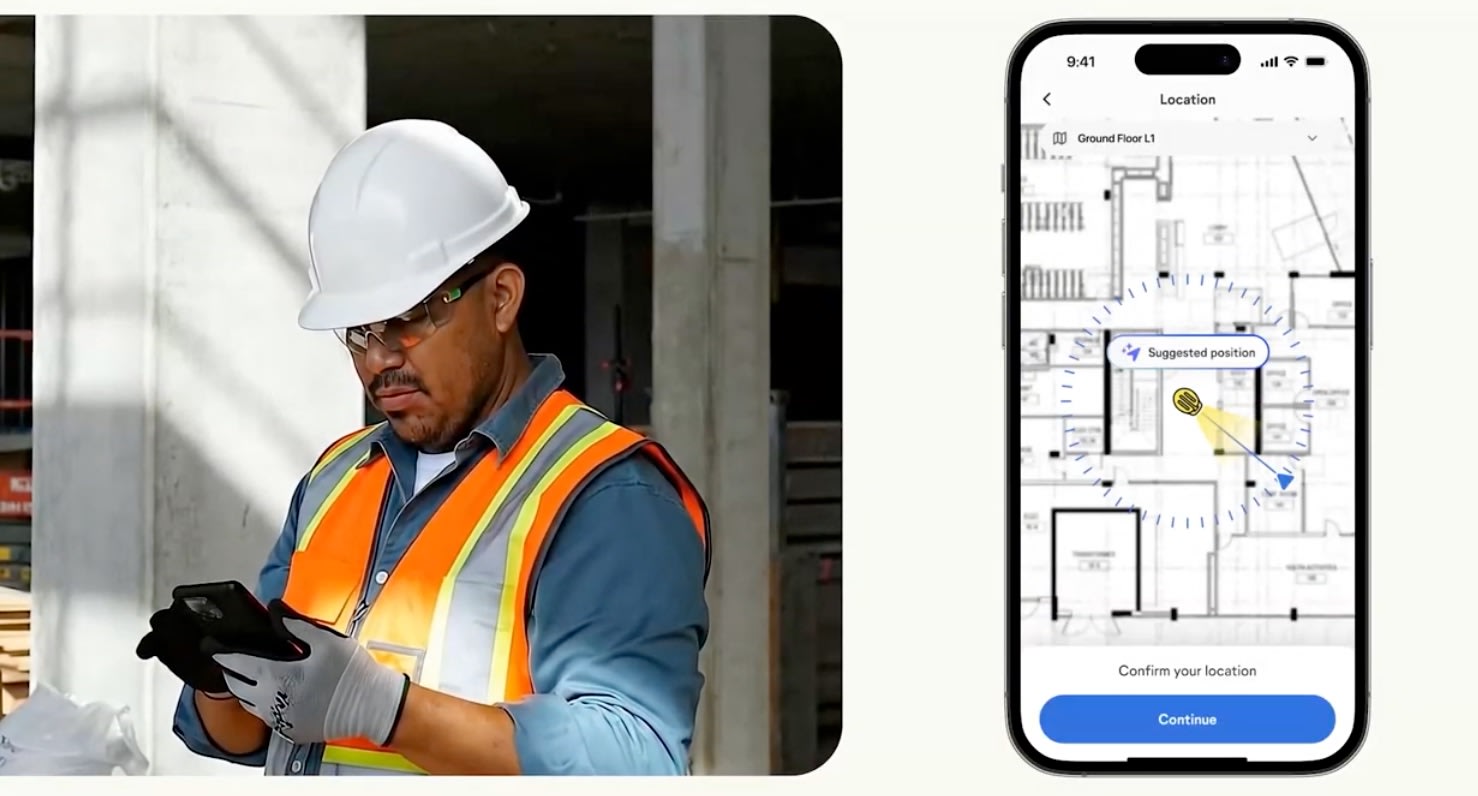
September 9, 2025 – OpenSpace today announced a significant advancement in Spatial AI technology at its Waypoint customer summit, giving smartphones real-time indoor positioning capabilities. This breakthrough, a critical component of OpenSpace’s Visual Intelligence Platform, marks a new era for field productivity specifically, and location technology broadly.
Accurate location information is an intrinsic part to a vast number of modern experiences, including navigation, materials tracking, transport and more. Location information is in particular paramount for real-world jobs: those that take place in the field, not in offices. GPS has been a transformative technology, reshaping these experiences and workflows, however it does not operate indoors. Existing solutions that provide indoor location involve the installation and maintenance of hardware systems, such as Bluetooth Beacons, which can be costly and impractical, especially on construction sites.
OpenSpace’s new Spatial AI capabilities address this challenge by providing indoor location tracking without the need for specialized hardware. This patent pending advancement, called AI Autolocation, compares real-time sensor readings from a user's smartphone with sensor maps generated from pre-existing 360° captures created on the OpenSpace platform. The result is an adaptive system that progressively refines its location estimations even as the jobsite itself changes over time. OpenSpace projects that, as the system matures, it will rival and ultimately exceed GPS-level accuracy, powered by ongoing machine learning.
This foundational innovation is first being deployed to power new capabilities in OpenSpace Field, a new system of work for field construction teams, also announced today. With AI Autolocation, notes and photos taken in the OpenSpace smartphone app are automatically pinned to floorplans and aligned to BIM in real-time. This automatic spatial awareness significantly reduces ambiguity, accelerates resolution, saves time, and keeps office and field teams in sync.
“For real-world industries, this is the biggest innovation since the shift from paper to PC,” said Michael Fleischman, co-founder and CTO at OpenSpace. “Construction sites are chaotic, ever-changing environments and achieving indoor positioning on smartphones required advances across different domains of Spatial Artificial Intelligence: sensor fusion, machine learning, dynamic map creation, and computational efficiency specifically for mobile devices. Delivering this breakthrough is a proud moment for OpenSpace and a testament that shows our commitment to unlocking the future of how construction teams work.”
Looking ahead, this AI Autolocation breakthrough lays the groundwork for advanced Spatial AI agents. While today's AI agents specialize in processing text-oriented data, construction demands spatial awareness, combining image data and location to simplify, automate, and augment complex work. These Spatial AI agents will enable proactive issue detection and resolution by flagging issues in specific zones and suggesting immediate actions. They will also provide executive-level insights, with AI-powered summaries derived from visual and spatial data delivering clear, actionable guidance.
“The future of AI in construction will be one of human and AI collaboration, empowering teams to focus on essential work while AI delivers intelligent assistance and insights,” said Fleischman. “We’re excited to build that future with our customers.”
For more information and to learn more about OpenSpace and its Spatial AI innovation, visit www.openspace.ai.
OpenSpace is the Visual Intelligence Platform for builders, using computer vision and AI to help commercial builders reduce risk and increase efficiency. Its image-first platform streamlines coordination between field and office teams, providing real-time intelligence for faster decisions and fewer delays. Customers like Suffolk, Comfort Systems, and Tishman Speyer rely on OpenSpace to gain critical insights from their jobsites, avoid destructive investigations, and finish projects ahead of schedule. To date, general contractors and trade partners have relied on OpenSpace to analyze imagery on more than 75,000 construction projects across 124 countries, representing over 52 billion square feet. To learn more, visit www.openspace.ai and follow us on LinkedIn.

